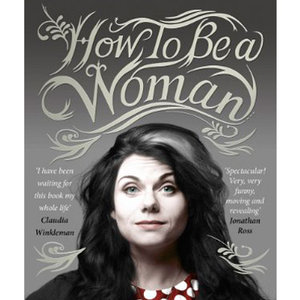 [This is an introduction to a series of posts on Caitlin Moran’s book How to Be a Woman. Click here for other posts in this series.]
[This is an introduction to a series of posts on Caitlin Moran’s book How to Be a Woman. Click here for other posts in this series.]
I made the mistake of starting Caitlin Moran’s How to Be a Woman on my lunch break in my favorite restaurant, a cozy, quiet French tearoom. After the first page I was giggling in delight, a huge idiotic grin plastered on my face. I guffawed before my soup arrived, causing the sedate looking couple sitting across from me to look up from their soup in alarm. I wanted to explain:
“No, it’s OK. I’m not crazy. Really. I have just found the perfect book. I can tell it’s going to be up there with Miss Piggy’s Guide to Life. It’s a blend of feminism and pop culture, part poignant memoir, part feisty feminist screed. It’s so smart and it’s HILARIOUS!”
However, they were carefully avoiding eye contact with me and so I got onto Facebook instead and started begging my Doves and Serpents friends to start reading with me. To sell the greatness of the book, I tried to find some highlights to quote and found myself wanting to copy over entire pages, which I basically did. And it worked! Soon we were all reading and discussing and it didn’t take long to realize that we wanted to write about it as well and that nothing less than a Tina Fey-style week would do. So, here it is, The D&S How to Be a Woman Week, wherein we’ll be discussing our favorite parts of the book and that scariest of all F-words — feminism.
There is no question that we are living in a moment of enormous promise and greater equality than we’ve ever had, but, despite what some well-meaning mansplainers or empowered women might tell you, we’re not done. The horrified silence that descends when I casually mention that I’m a feminist in groups of women is enough to convince me that we still need feminism, but if you need more evidence, just look at the many parts of the world where women can still be bought and sold, the wage gap, Todd Akin and beer advertisements. Or look at the impact that women voters had on last week’s election. Progress has been made, but we’re still living in the house that patriarchy built. We’ve kicked some of the nastiest patriarchs out and now is not the time to retreat into our own rooms thinking “Job, done!” We need to stay and make sure that we have a say in how the house is remodeled. And Moran’s funny, passionate book provides an insightful framework for where women are now. Please join us this week as we discuss some of the book’s highlights, from how there is no good word for boobs to motherhood to why Moran believes that all women in this day and age are already feminists. If you’ve read the book, join in. If you haven’t, what are you waiting for?!
In a fantastic interview with Fresh Air’s Terry Gross (Go listen now! It’s a great introduction to Moran and the book), Moran says, “People get really scared when women reclaim words, talk about themselves honestly and also make jokes because it’s a really unstoppable combination. It’s part of the reason why I decided to use humor in my book because it’s kind of hard to argue with someone who’s making you laugh.” We couldn’t agree more. Yes, Moran is smart and she made us think. Yes, she tackles some big issues. But the thing that made us fall in love with the book is how much she made us laugh.
;
;
;

I reserved this book at the library last week and it won’t be available to me for 6 weeks. Even though that is frustrating for me, I guess it’s a good thing that the book is so popular.
Mark, you could always go all in, Ed S style, and buy the book. I dare you.)
Heidi, I took your dare. I was out shopping today and stopped in at the Barnes and Noble to see if they had a copy. They did, and it is now on my nightstand. I read the first few chapters and my sides hurt so much from laughing that I honestly fear I might injure myself if I don’t take a break.
If I had been keeping a list over the years of the funniest things I have ever read, this book would already have produced 2 or 3 solid contenders for the Top Twenty. I’m afraid that Sunday during church my mind will flash to the context of the sentence “But, man, what a maid-of-honor’s speech that was.” and I’ll have to bite my lip, hard, to keep from LOL-ing.
Moran has mastered the craft of being deadly funny while being dead serious. In that way, she surpasses Twain or P. G. Wodehouse, because she is not *just* funny. I really love her for that.
Yes! I laughed SO HARD in so many places.
And yes, she’s not JUST funny. The best kind of book, then, right?
Mark, I also reserved it when it came out, and I was number 32 on the waiting list! It has been an insanely popular book, but with good reason. Moran rocks!
Heidi – you are exactly right about the humor being the book’s charm. She delivers so many smiles, laughs, and giggles that the big ideas go down easy. You’ve got me excited about this series!
I’m so glad you guys are writing a whole week’s worth of posts. I just love Caitlin Moran. I’m reading her newest book Moranthology right now.
Are you enjoying it? Moranthology is on my Christmas list.